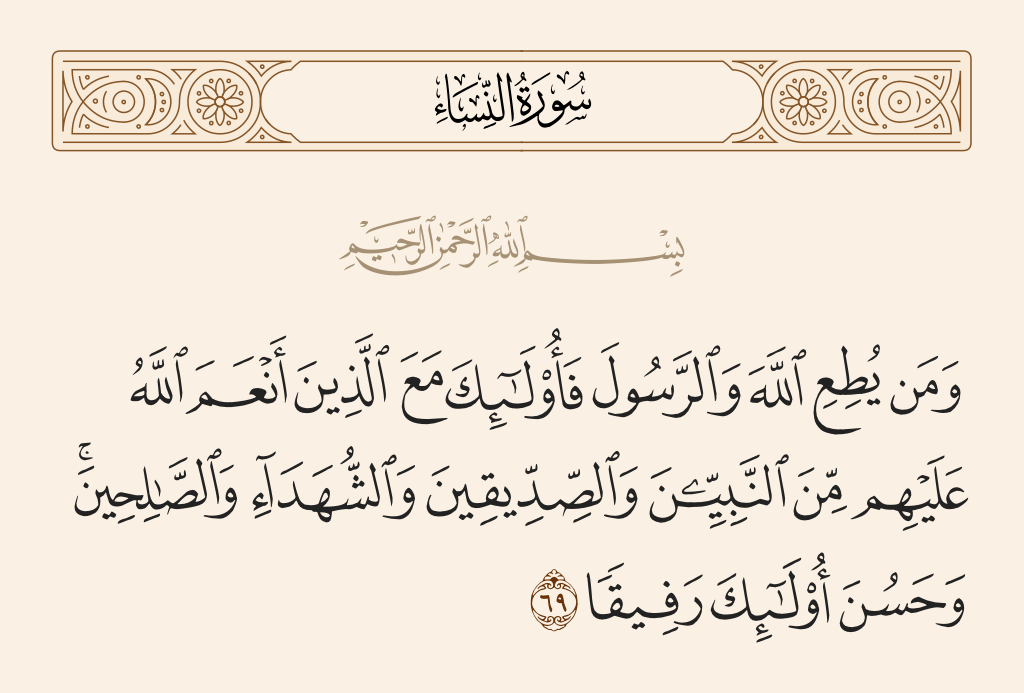Surat An-Nisa’ Verse No. 69: Reading and listening
Translation of the verse 69 from Surah An-Nisa’ : Number of verses 176 - - page 89 - Part 5.

﴾وَمَن يُطِعِ ٱللَّهَ وَٱلرَّسُولَ فَأُوْلَٰٓئِكَ مَعَ ٱلَّذِينَ أَنۡعَمَ ٱللَّهُ عَلَيۡهِم مِّنَ ٱلنَّبِيِّـۧنَ وَٱلصِّدِّيقِينَ وَٱلشُّهَدَآءِ وَٱلصَّٰلِحِينَۚ وَحَسُنَ أُوْلَٰٓئِكَ رَفِيقٗا ﴿
[ النساء: 69]
And whoso obeys Allah and the Messenger (Muhammad SAW), then they will be in the company of those on whom Allah has bestowed His Grace, of the Prophets, the Siddiqun (those followers of the Prophets who were first and foremost to believe in them, like Abu Bakr As-Siddiq), the martyrs, and the righteous. And how excellent these companions are!
English - Sahih International
And whoever obeys Allah and the Messenger - those will be with the ones upon whom Allah has bestowed favor of the prophets, the steadfast affirmers of truth, the martyrs and the righteous. And excellent are those as companions.
Tafheem-ul-Quran by Syed Abu-al-A'la Maududi
(4:69) And he who obeys Allah and the Messenger -they shall be with those whom Allah has favoured -the Prophets, those steadfast in truthfulness *99, the martyrs, and the righteous." How excellent will they be for companions! *100
Tafheem-ul-Quran by Syed Abu-al-A'la Maududi
*99). Siddiq denotes someone who is utterly honest, someone whose devotion to truth has reached a very high point. Such a person is always upright and straightforward in his dealings. He supports nothing but right and justice and does so with sincerity. He opposes whatever is contrary to truth, and does not waver in his opposition to falsehood. His life is so unblemished and selfless that even enemies, let alone friends, expect of him unadulterated probity and justice.
The term shahid (pi. shuhada') means 'witness'. It signifies one who attests to the truth of his faith with his whole life. He who lays down his life fighting for God is called a shahid because by this sacrifice he confirms that his confession of faith was backed by a deep, genuine conviction of its truth, and that he valued it above his own life. The term shahid is also applied to those outstandingly honest people who are so trustworthy that their testimony, on any matter, is accepted without hesitation. Salih denotes one whose belief and thinking, motives and intentions, words and deeds, are based on righteousness. In short, he is a person whose life as a whole is oriented to righteousness.
*100).He who enjoys, in this world, the company of the kind of people mentioned in this verse, and whom God judges worthy of the same company in the Hereafter is fortunate. The fact is that unless a man's natural sensitivity has atrophied, the companionship of corrupt and wicked people is a painful punishment even in this transient world, let alone that one should be subjected to the perpetual companionship of such people in the abiding life of the Hereafter. Good people have always longed for the company of like people, both in this world and the Next.